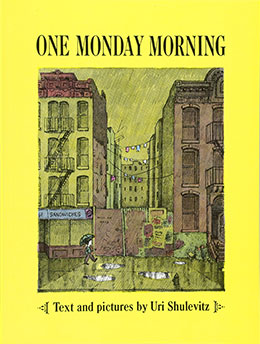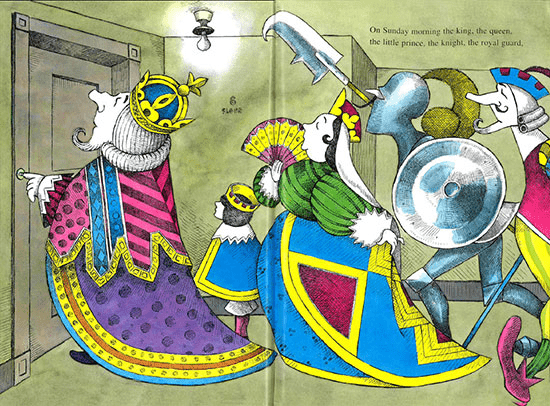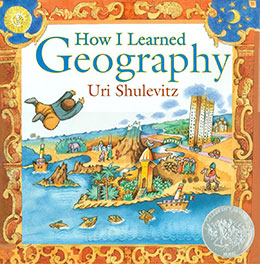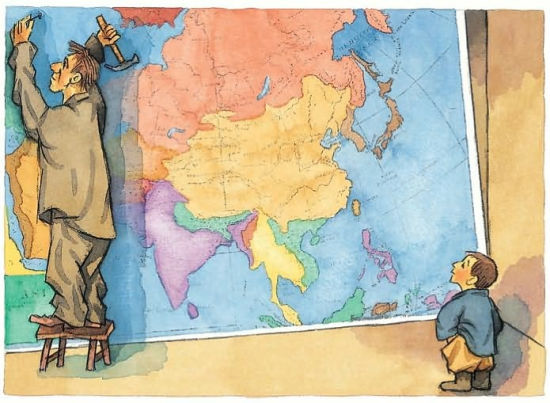In two of his picture books Uri Shulevitz introduces a child alone in a room, isolated, similar to our quarantined children today who are stuck at home, cut off from friends. But where is the iPad, television or computer screen? Look closely — there are none in the pictures.
The child is alone when the magic begins. The source? His imagination.
 In One Monday Morning (1967) it’s raining. We see the block and the puddled street. Turn the page and the first visitor arrives: a king in turquoise, magenta and yellow, followed on the next page by the queen and the little prince, a striking contrast to the drab city neighborhood where the child lives. Alas, the little boy is not home. He’s waiting at the bus stop.
In One Monday Morning (1967) it’s raining. We see the block and the puddled street. Turn the page and the first visitor arrives: a king in turquoise, magenta and yellow, followed on the next page by the queen and the little prince, a striking contrast to the drab city neighborhood where the child lives. Alas, the little boy is not home. He’s waiting at the bus stop.
The pattern continues through the week. Every day the parade of visitors grows longer. And each day the little boy isn’t home to welcome them. He’s on the subway, at the laundromat or the grocery store, looking at toys in a shop window or trying to free his kite from a streetlight. The neighborhood is somber — grey, blue and brown with fire escapes, garbage cans, graffiti, an urban world, lacking in color and vitality.
But the visitors have plenty of both.

Each day the line of visitors grows, crowding the stairwell and the hall in glowing colors and each day the little prince decrees, “We shall return …” Finally, on Friday when the line now includes the king, queen, prince, knight, guard, cook, and barber… and last, the little dog, the boy is home to welcome them.
But the book doesn’t end there. On the last wordless pages we see the boy with a deck of cards spread on a table, a doll on the windowsill, a drawing of a dog on the wall. The visitors, animated by his imagination, were inspired by the cards and toys in his room.
 A similar transformation happens in Shulevitz’s autobiographical picture book How I Learned Geography (2008). To escape war, his family fled to a foreign city. “I had no toys and no books. Worst of all: food was scarce.” Father went to the market to buy bread but instead brought home a map. “‘No supper tonight,’” Mother said bitterly. ‘We’ll have the map instead.’”
A similar transformation happens in Shulevitz’s autobiographical picture book How I Learned Geography (2008). To escape war, his family fled to a foreign city. “I had no toys and no books. Worst of all: food was scarce.” Father went to the market to buy bread but instead brought home a map. “‘No supper tonight,’” Mother said bitterly. ‘We’ll have the map instead.’”
Father nailed the huge map to the wall. “Our cheerless room was flooded with color.”

The child lay on the floor drawing the map. He recited the exotic names “like a magic incantation and was transported far away without ever leaving our room.”
Glowing illustrations fill the pages as the child soars above the map, leaps and dances in pictures of desert and beach, climbs mountains, visits temples, jungles and cities, all imagined landscapes. “And so I spent enchanted hours far, far from our hunger and misery. I forgave my father. He was right, after all.”
In these two books, published forty years apart, Uri Shulevitz shows us the immense power of a child’s imagination, his ability to transcend the present moment, no matter how drab or bleak. These are hopeful, joyful celebrations of imagination. The electronic screens in our children’s lives today cannot compare.

This article offers lovely insights to the meaning and importance of imagination. It immediately made me want spend hours with Uri Schulevitz’s illustrations.
Thanks Christine. This column makes me want to find these books and spend time with them – and share them with kids I know.
I have always loved both these books. Thanks for reminding us of the importance of the imagined life especially during the pandemic.
These are wonderfully fanciful books for parents and teachers to share with children. Imagine the lively and inventive conversations that could grow out of that sharing.